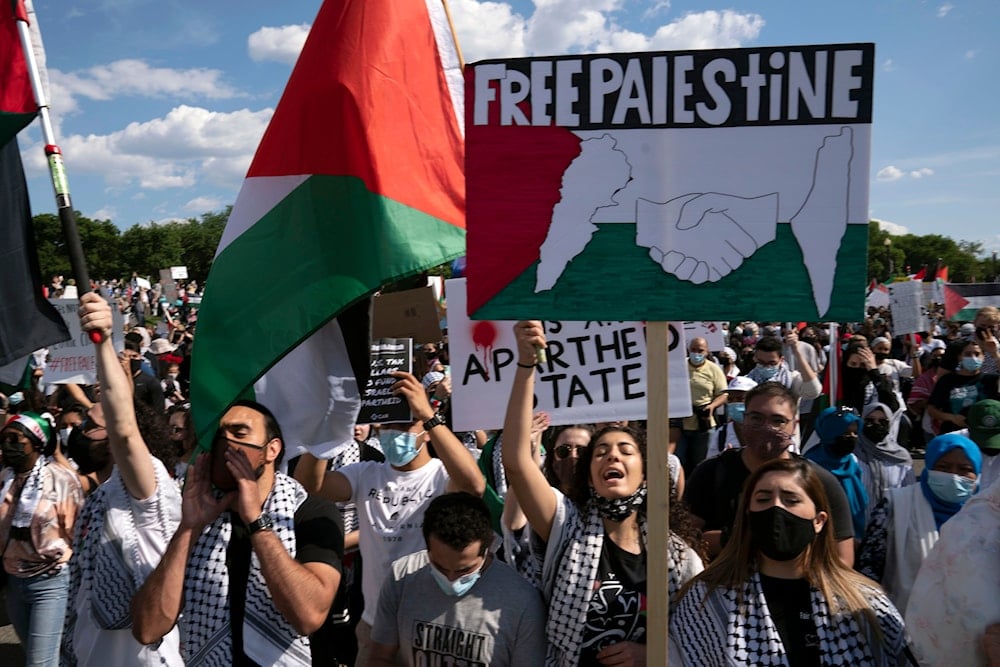Universities use legal actions to end anti-war activism: The Intercept
US universities have resorted to legal action to curb anti-war activism, effectively violating the First Amendment, the foundational law protecting free speech.
-

Activists supporting Palestine chants as they gather at the Washington Monument during a demonstration in Washington, on May 15. 2021. (AP)
Big universities are now relying on legal action to prevent anti-war activism, after the series of pro-Palestinian encampments that swept the United States since the start of the Israeli war on Gaza.
A report by The Intercept states that "Notice of Restrictions" signs were posted at the University of North Carolina, Chapel Hill's campus during the first week of October 7, 2024.
The signs included a list of do's and don'ts such as: Don't wear masks to conceal one's identity. Don't throw any objects, besides those traditionally used for recreational purposes, like a frisbee. Don’t set up camp: “No temporary structures whatsoever, including but not limited to stages, tents, chairs, hammocks, tables, signs and displays.”
Also, all students must carry a student ID to access certain buildings.
According to The Intercept, the new rules seem intended to suppress student protests, though they do not explicitly state this.
Students and Staff targeted in new restrictions
A student who was arrested at UNC explained that “It’s a vague threat for anyone who wants to organize, to anyone that wants to express their First Amendment rights."
The Intercept argues that these measures could harm students, putting their physical, academic, and long-term professional futures at risk merely for exercising their right to voice their opinions.
At some of the nation’s largest and most prestigious public universities, including UNC-Chapel Hill, the University of Massachusetts Amherst, and the University of California, Los Angeles, mass arrests were followed by rules aimed at suppressing free speech and protests, according to the report.
Graeme Blair, a political science professor at UCLA who was among those arrested during a spring protest, said, "College students often have a really important role in social change in the country," adding that "The implications are pretty serious, not just for speech on Palestine, but for speech on other unpopular issues, which in many ways is the point of protests.”
Blair underwent a disciplinary process following his arrest and is now suing the university for violating his First Amendment rights. He maintains that his arrest led to him being denied promotion to full professor.
“In addition to the arrests, the university added insult to injury and decided to send every person who was arrested — students, faculty, and staff — through a disciplinary process, even though what they were doing was exercising their constitutional right to free speech,” Blair said.
'Protesters arrested for practicing their rights'
Across the country, college protesters have faced charges such as trespassing, failure to disperse, resisting arrest, and assaulting government officials, according to The Intercept.
At UMass Amherst, over 135 people were arrested on May 7, while 36 were detained and six arrested at UNC-Chapel Hill in April. UCLA saw 231 arrests during a six-week period from May to June.
The six arrested at UNC-Chapel Hill were offered plea deals, but a student who spoke anonymously to The Intercept refused. "That is justice without trial," they said. "You don’t actually get to determine whether what you did was wrong; you are forced to come to that conclusion yourself without actual knowledge of the legal system."
The Intercept found that demonstrators have faced academic probation, including restrictions on participation in school organizations and holds on degrees and academic records, preventing students from graduating.
Despite increased security on campus, the students remain determined to support the Palestinian solidarity movement and stay active in Students for Justice in Palestine, according to the report.

 4 Min Read
4 Min Read








